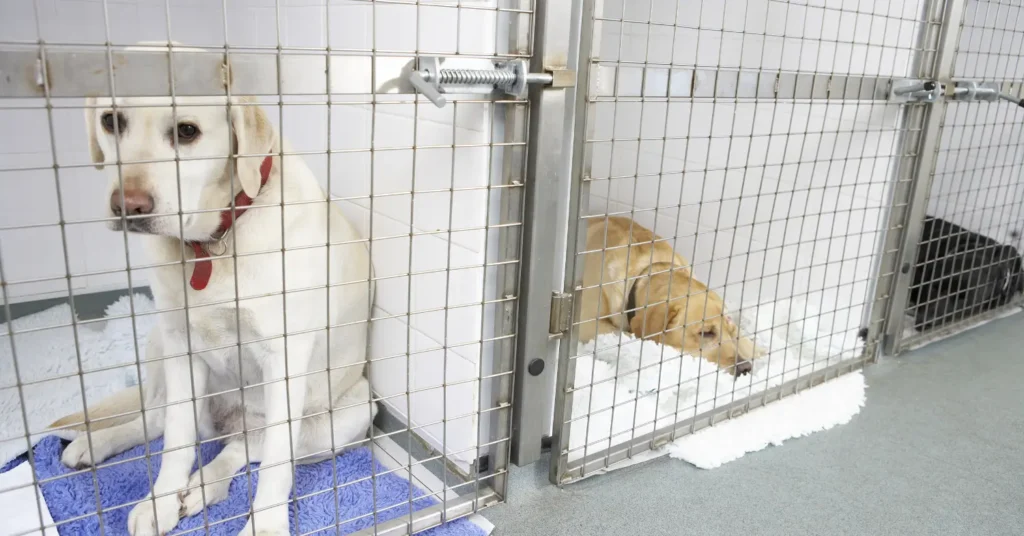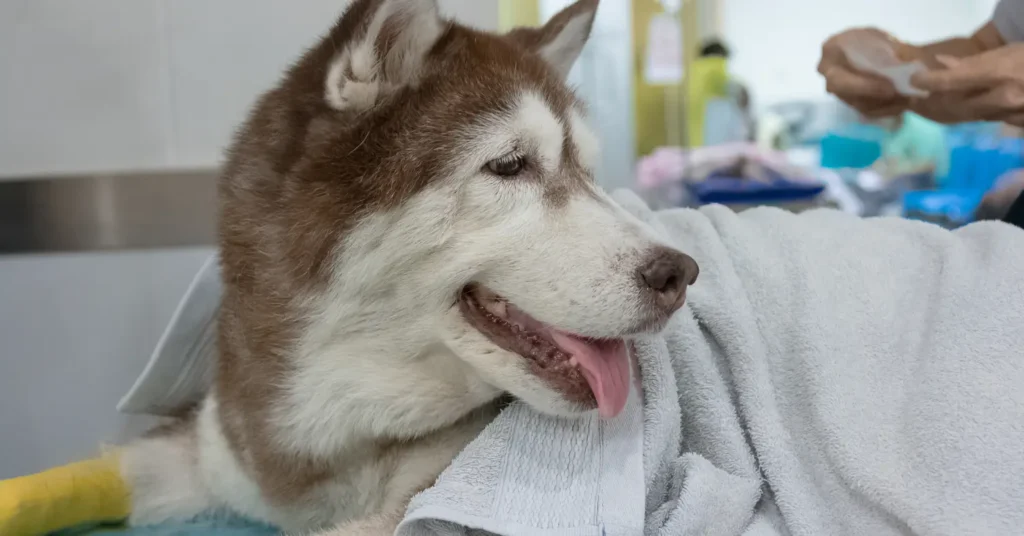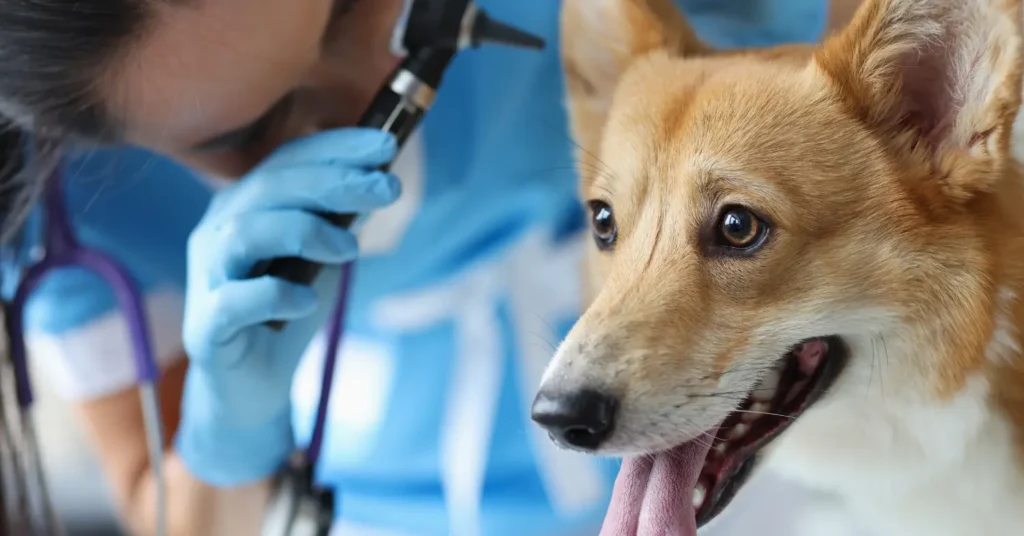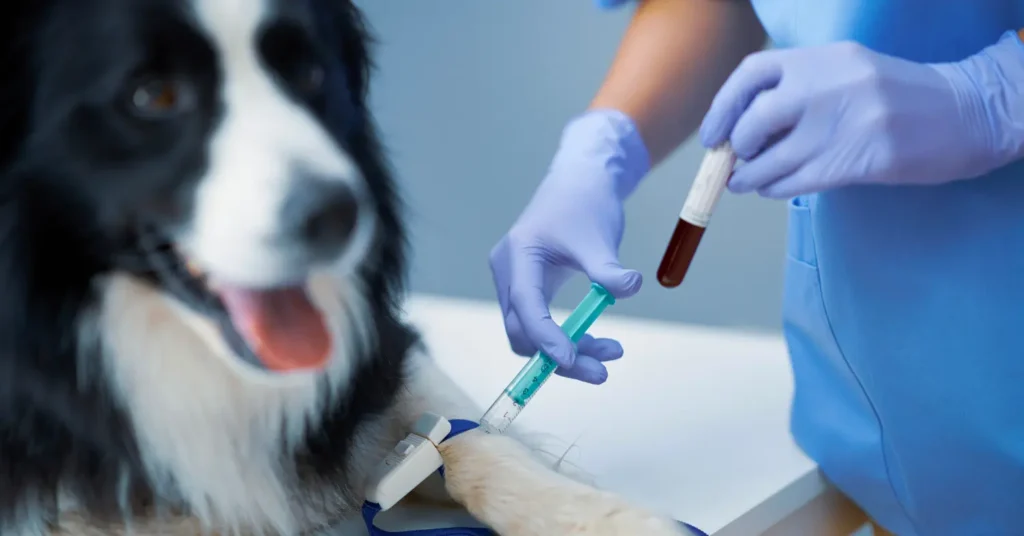What is kennel cough in dogs? Kennel cough is an airborne infection that passes from one dog companion to another dog. If your dog starts displaying a persistent dry, hacking cough, reminiscent of something lodged in their throat, kennel cough might be the likely cause.
It is also recognized as canine infectious respiratory disease (CIRD) or infectious tracheobronchitis, this respiratory ailment in dogs can swiftly spread, posing serious health risks if left untreated.
Diagnostic tests become necessary for severe cases, suspected pneumonia, or systemic disease. Blood work, chest X-rays, and Polymerase Chain Reaction (PCR) Assay are common diagnostic tools.
Fortunately, there exists a kennel cough vaccination capable of preventing your dog from contracting this respiratory ailment. We will talk about kennel cough in dogs, covering its nature, symptoms, treatment options, and preventive measures. Understanding these aspects is pivotal for safeguarding your canine companion’s health and well-being.
What is Kennel Cough in Dogs?

Just as human colds can come from different viruses, kennel cough has its own mix of causes. One of them is a bacterium known as Bordetella bronchiseptica, often just called Bordetella.
Dogs catch kennel cough when they breathe in tiny bits of bacteria or viruses. Tthese bacteria sneak into their breathing passages. Viruses, like canine adenovirus and distemper virus, team up with Bordetella, making it more likely for dogs to catch the infection.
The dog’s respiratory tract act as a defender with a shield of mucus. This shield usually catches the pesky particles, but certain things can weaken it, leaving dogs vulnerable to kennel cough.
Here are the suspects:
So, kennel cough isn’t just a random cold for dogs; it’s a puzzle with multiple pieces, each playing a part in the infection.
Causes of Kennel Cough
The etiology of kennel cough, a prevalent canine respiratory condition, involves a cast of bacterial and viral protagonists. Foremost in this lineup is Bordetella bronchiseptica, recognized for its role in instigating inflammation within the upper respiratory tract of dogs.
Transitioning to the viral domain, Canine Parainfluenza (CPIV) emerges as a significant contributor, exhibiting symptoms reminiscent of canine influenza while requiring distinct vaccinations for effective management.
A spotlight on Canine Adenovirus 2 (CAV-2), or the infectious canine laryngotracheitis virus, underscores its swift transmission, orchestrating a respiratory symphony characterized by canine coughing.
How Kennel Cough Spreads

Dogs often contract kennel cough in communal settings such as boarding kennels, dog parks, or training groups. Airborne droplets, direct contact like nose-touching, or contaminated surfaces contribute to its transmission. Vigilance is essential, especially in places where dogs converge, to curb the spread.
These droplets contain bacteria or viruses, initiating inflammation in the respiratory tract upon inhalation. The prevalence of kennel cough often stems from dogs sharing spaces like kennels and shelters, hence its nomenclature derived from these communal environments.
Infections transmitted through various channels:
Kennel cough is generally manageable in healthy adult dogs. However, it can be more severe in puppies under six months or dogs with compromised immune systems.
It’s important to know that not just dogs, but also other animals like cats, rabbits, horses, mice, and guinea pigs can get kennel cough. Surprisingly, humans can catch it too from their pets. People with weakened immune systems, like those dealing with conditions such as lung cancer or HIV, are more likely to get this illness.
Kennel Cough Symptoms

Symptoms include a distinctive strong cough, runny nose, sneezing, lethargy, loss of appetite, and a low-grade fever. While treatable in healthy dogs, any coughing should prompt a vet visit, as it might signal a more severe underlying ailment.
In the clinical observation of kennel cough symptoms in dogs, practitioners may note the manifestation of the following clinical signs:
It is imperative for medical professionals to acknowledge that some dogs can serve as asymptomatic carriers of the disease. Despite displaying no overt symptoms, these carriers can still act as sources of infection, transmitting the pathogen to other canines.
Interestingly, if your canine companion is grappling with kennel cough, their appetite and energy levels might stay relatively unaffected. Despite the cough’s persistence, these dogs tend to maintain their usual enthusiasm for food and daily activities.
In more serious situations, or if you let it slide without attention, kennel cough may throw in decreased appetite, lethargy, a hint of depression, and a spike in body temperature. It’s a wise move to consult your veterinarian once these symptoms raise their heads.
How Long Does Kennel Cough Last?

In the majority of kennel cough cases, dogs exhibit a full recovery within a span of 1 to 3 weeks. However, it’s noteworthy that this recuperation period may extend to 6 weeks for older dogs or those grappling with concurrent medical conditions.
While the prognosis is generally favorable, vigilance is paramount. A persistent or worsening kennel cough warrants prompt veterinary attention, as unchecked cases carry the potential risk of progressing to pneumonia. Veterinary follow-up is recommended if the anticipated recovery timeframe is exceeded.
Timely recognition of concerning signs coupled with proactive veterinary engagement remains pivotal in steering the course of kennel cough cases towards successful resolution.
With an incubation period ranging from two to 14 days, some dogs can harbor the infection for extended periods, up to months, without displaying any noticeable symptoms. This prolonged carrier state adds a layer of complexity to the management of kennel cough.
Diagnosis Of Kennel Cough

Unlike a single diagnostic test, kennel cough diagnosis relies on symptoms and exposure within the incubation period. Swabs may be employed to identify the specific virus or bacteria, though this information may not always guide treatment. Radiographs become useful if complications are suspected.
Keep your dog away from other canine buddies pronto. It’s like a doggy timeout to prevent spreading the coughy commotion. Waste no time—reach out to your vet for advice. Quick communication ensures you’re on the right track to helping your pup bounce back.
There exist diverse strains of kennel cough, increasing the likelihood of your dog to be diagnosed with the infection multiple times. In the case of your dog acquiring the Bordetella bronchiseptica strain, a typical immunity period of six to twelve months follows, reducing the risk of reinfection. Regular awareness and preventive measures are pivotal in maintaining your furry friend’s well-being.
Treatment of Kennel Cough in Dogs

Dealing with mild cases of kennel cough usually involves giving your furry friend about a week of rest. However, your dog’s veterinarian might opt for a prescription of antibiotics to ward off any potential secondary infections. To alleviate symptoms and ensure both your dog’s and your peaceful sleep, cough suppressant medications may also be recommended.
Prescribed medications like steroids, cough suppressants, and anti-inflammatories aim to enhance your dog’s comfort. Here are some additional measures to improve your dog’s comfort:
While nebulizers and vaporizers with inhaled antibiotics or bronchodilators could be beneficial, they’re not commonly prescribed. For personalized treatment advice, it’s best to consult with your veterinarian. When taking your coughing canine companion for a stroll, consider using a harness instead of a collar. This helps prevent irritation in the tracheal area, which could worsen the cough or potentially lead to damage.
If you have multiple pets at home and one displays coughing signs, it’s likely that all dogs in your household have been exposed. If your dog usually enjoys dog daycare during your work hours, it’s advisable to keep them at home temporarily to prevent the spread of the cough to other canine friends.
Prevention of Kennel Cough in Dogs: Vaccines

The kennel cough vaccine is versatile, available in oral, intranasal, and injectable formats. Administered in two doses spaced two to four weeks apart, it typically necessitates a subsequent booster every six months to a year. Consequently, relying solely on the vaccine may not shield your dog from all potential causes of kennel cough.
Not only bordetella but some other causes like bordetella bronchiseptica, canine adenovirus type 2, canine parainfluenza virus, canine respiratory coronavirus, and mycoplasma can also cause kennel cough. So, just the vaccine might not cover all the things that can make your dog catch kennel cough.
When it comes to preventing kennel cough in dogs, it’s essential to be aware of the infections covered by basic vaccinations. These vaccinations, administered during puppyhood and through subsequent boosters, target canine adenovirus type two, canine parainfluenza virus, canine distemper, and canine influenza.
Bordetella bronchiseptica, a prevalent bacteria causing kennel cough, can be addressed separately through vaccination. It’s crucial to note that due to various strains of the infection, this vaccine doesn’t guarantee absolute protection but aims to mitigate symptoms. Importantly, vaccination proves ineffective for dogs already in the incubation stage of kennel cough.
Bonus Read | Kennel Cough In Dogs
Kennel cough, a respiratory infection in dogs, is brought about by various bacteria and viruses. It particularly affects vulnerable groups, including puppies, older dogs, and those with pre-existing health issues, elevating the risk of complications like pneumonia.
Despite its potential severity in certain cases, kennel cough is generally mild and tends to resolve without treatment within a few weeks. Interestingly, apart from the characteristic coughing, dogs infected with kennel cough often exhibit no significant signs of feeling unwell.
The incubation period for kennel cough spans from two to 14 days, during which the infection may remain asymptomatic. This delayed onset highlights the importance of vigilance, especially if your dog has recently been in proximity to other canines.
On a preventive note, a kennel cough vaccine is readily available. It is commonly mandated, particularly when dogs are placed in kennels, given the highly contagious nature of the infection within such confined spaces. Taking this precautionary measure helps curb the spread of kennel cough, ensuring the well-being of our furry companions.
You Might Also Like:




